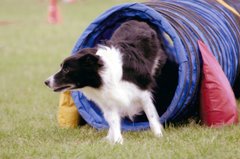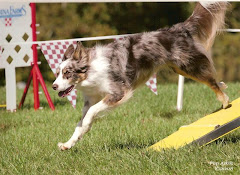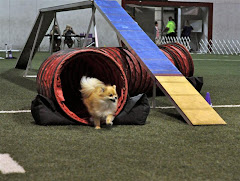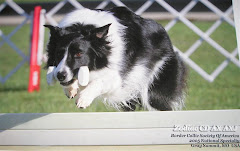Roundworms (toxocara species) are common intestinal parasites of puppies and kittens but can also infect pets of any age. These are the "spaghetti" like worms that can be seen with the naked eye.
 |
| Adult Roundworms |
Usually a dog ingests the eggs through normal grooming after picking up the eggs on their paws or fur while outside. Once ingested, the larvae hatches out and burrows its way out of the intestines. Some travel to the liver and become encysted, sometimes for years. The rest travel to the lungs where they are coughed up and swallowed and return, once again, to the intestinal tract. Once back in the intestines they mature and begin to reproduce and lay eggs, which are passed in the feces and the cycle begins again. When the encysted larvae move out of the liver, they travel to the lungs as the others do and the life cycle continues. It seems unclear (at least I wasn't able to find a good answer) as to why some larvae encyst and some don't although encysting seems more common in older puppies or adult dogs. It also seems unclear, other than gestation) what factors cause the encysted larvae to begin migration.
If the infected dog happens to be pregnant or nursing then when the larvae leave the liver they travel to the uterus or mammary glands instead of the lungs. In the uterus they can be passed to the puppies before birth. They can also be passed to nursing puppies through the milk but these puppies were likely infected in utero anyway.
Rodents or other animals can also ingest infective eggs. In this case they larvae encyst and remain that way until the rodent is eaten by a dog and then the life cycle proceeds as above.
Roundworms can cause diarrhea and vomiting, or in severe cases pneumonia or intestinal obstruction. They also account for those underweight, pot-bellied puppies with dull dry coats. Roundworms are diagnosed by observing them in the stool or vomit or by identifying the eggs on fecal flotation. It should be assumed that all puppies are born with roundworms.
 |
| Roundworm egg |
Roundworms are easily treated as most available deworming products are effective against roundworms and many heartworm preventatives also treat roundworms. These products however, are only effective against the intestinal stage of roundworms, not the encysted stage. This is why even with a routinely dewormed female dog, the puppies are still born with roundworms as pregnancy seems to cause the encysted stages to begin migration.
Also a minimum of two dewormings at least 2 weeks apart are needed to treat a roundworm infection because the length of the life cycle and the lack of efficacy of dewormers on the non-intestinal stages. Cleaning up the stools of any infected pet will also limit the contamination of the environment, thus limiting future infections.
Zoonotic potential
Zoonotic diseases or parasites are ones that can be transmitted to humans. Roundworms are one of the more serious parasites than can do this. Children are most at risk and typically become infected by inadvertently ingesting infective eggs (think playground dirt and sandboxes!). Once ingested the worm tries to complete its life cycle but get lost since they are not in their natural host. They often end up in the abdominal organs or more commonly in the eye-which can result is serious disease or permanent blindness. This can be prevented by limiting contact with soil, sand, etc and routing hand washing.


.jpg)
.jpg)



.jpg)



3 comments:
I so love finding these at the shelter...
IMO, the vomited ones are the grossest.
My mustang filly had roundworms last summer, and it was the first time I had ever seen an actual worm in horse poop and I have had horses for 20+ years. It was the grossest thing I have ever seen. I haven't seen them in my dogs and cats, just tapeworms. I sure hope not too. Yuck.
Thank you for the post! Last night, I pulled a worm that looks exactly like a roundworm from my dog's long fur. Will take in a sample now. Thanks for your informative posts, as well as the fun ones. Fay, with 2 CWC and 2 brand Xs.
Post a Comment